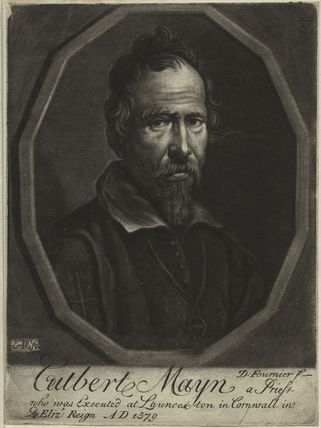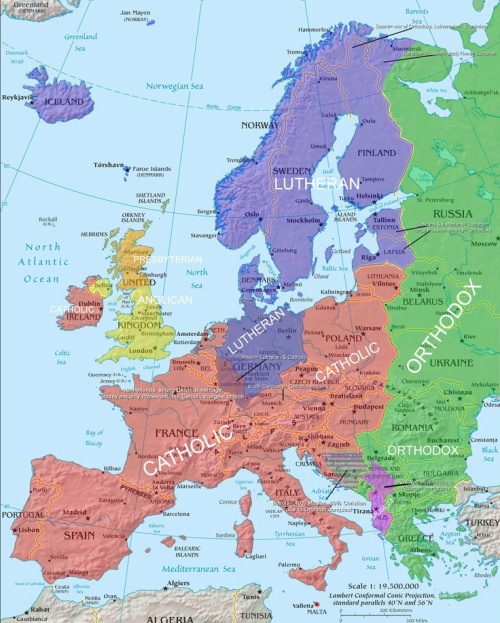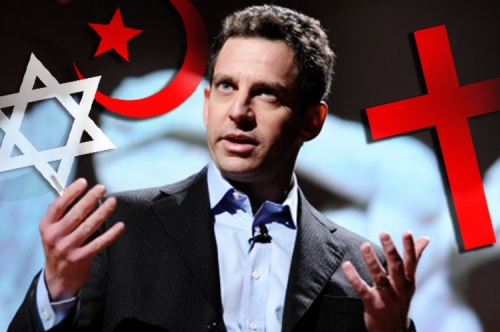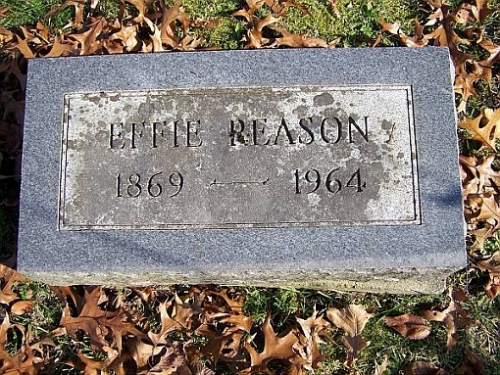Was Luther an Antichrist? The Bible suggests yes.
http://headhearthand.org/blog/2014/02/20/seven-characteristics-of-the-antichrist/
Today’s link is from David Murray’s blog. He identifies as a pastor, professor, and author, so even though it is a blog post rather than news, it is be respectable. In his post he discusses some marks he sees as indicating antichrists. Let’s look at each point and see whom it may identify, as is subsequent post points whom he thinks is the antichrist. In this post I’ll look at what his points tell me about whom an antichrist might have been.
Point 1: Lawless
Mr. Murray searches Scripture and finds that the antichrist is one who disregards God’s law. Let’s look at part of God’s law of the new covenant — the use of Sacraments. The Catholic Church has 7 Sacraments, but many have disregarded some of the sacraments. Anglicans and the Reformed, for instance, have only 2 sacraments — Baptism and the Lord’s Supper. Lutherans have 3 (the Anglican two plus Absolution). Quakers have none. Or, looking at law more strictly speaking, who has kept the command of Jesus that divorce is against the law of God? Only Catholics don’t allow divorce (for you who might chime in that annulment is Catholic divorce; an annulment is actually a claim of a marriage never existing, not the dissolution of a marriage). This rejection of the law of God is a good argument for the founders of Protestantism to be considered antichrists.
Point 2: Destroyer
This point is that the antichrist is a destroyer. Well, the destruction of the unity of the Christian Church, which is something Jesus himself prayed would be kept intact (“that they may be one“), was again brought about by the founders of Protestantism. Protestants now aren’t responsible for this, they aren’t antichrists, but those founders of Protestantism who split the Church seem to fit the bill so far. And in the bloody split of the church, people on all sides were destroyed physically by death. One such famous priest killed was Cuthbert Mayne, who became a priest in France and went to Anglican England to die for his faith.
Point 3: Opposition to God
The first step in understanding this is to know that Christ and his Church are mysteriously one entity. St. Augustine says, “Marvel and rejoice, we have become Christ”. Pope St. Gregory says, “Our redeemer has shown himself to be one person with the holy Church”. St. Tomas Aquinas states, “Head and members [Christ and Church] form as it were one and the same mystical person”. Joan of Arc concludes, “About Jesus Christ and the Church, I simply know they are just one thing”. (For citations see CCC 795). This oneness is why Paul talks about Christ being formed in us (Galatians 4:19). As Colossians puts it, Jesus is, “head of the body, the Church”.
Therefore one who is in opposition to the Church is one who is in opposition with Jesus. Again the Protestant Reformers come to mind. Their opposition to the Church created a replacement for it, and now people might go to various denominations instead of directly to the Body of Christ. Which brings us to the fourth point of Mr. Murray.
Point 4: Substitution
The antichrist tries to substitute himself for God. Mr. Murray says this point is that the antichrist, “is not necessarily an enemy from outside the church, but from inside it. He opposes Christ by replacing him, by taking Christ’s titles, worship, and roles.” This is exactly what the Protestant founders did with the Church, the Body of Jesus. They replaced the worship of Jesus passed down from Jesus himself with worship of a Jesus created more after their own thoughts and desires. It is easy to look at the insecurities of say, Luther, and see why that would psychologically drive any logical person to say we don’t need to cooperate with the mercies of God for our salvation. Cooperation for such an insecure person means too great a risk of losing God. Psychologically speaking, Luther makes excellent points. Luther created a very psychologically fulfilling vision of God, the only problem is that it is a replacement of the truth, which Mr. Murray says is a sign of the antichrist.
Point 5: Deceiver
These Protestant founders then used this psychologically fulfilling vision of God to deceive people away from the fullness of the truth. By their preaching and actions they deceived people into the substitute Church, the various Protestant denominations. With admittedly humanly wise words they brought people out of the fullness of truth. They did not come expressly to destroy the Church, but under the deception of “reform” brought about that effect.
Point 6: Heretic
This obviously tie ins with previous points. Mr. Murray says, “THE ultimate Antichrist will not deny everything about Christ, but just enough to undermine the power of Christ’s gracious salvation.” The Protestant denominations still have large swaths of truth — most of the books for the Bible, Baptism, Marriage, the necessity of Grace, even various aspects of predestination and so forth. In doing so they undermine the power of Christ’s salvation through the fullness of all the Sacraments he gave us and in the fullness of the Truth passed down to us from generation to generation.
Point 7: Politics
Any student of the Reformation can tell you that things got very politically messy. The German princes used Luther to advance their independence. Henry VIII used the Reformation to get a politically expedient divorce. If not for the political involvement to advance their temporal power, the Reformation would have been much more unlikely to get off the ground. It is not coincidence that religious maps of Europe coincide with political boundaries.
Presbyterianism was founded in Scotland. Anglicanism was founded in England. Lutheranism was founded in Germany, and adopted by Scandinavian princes. An authentic reformation should have effected the whole Catholic world, but instead it remained tied to principalities. Political expediency drove the Reformation forward, which again is a sign that the founders were antichrists.
Now, in turning the page to Mr. Murray’s next blog post, he surprises by saying it is the Pope who is the antichrist. This is the opposite of what I took his post to be implying, but it is also an old claim (after all, no news is new!). While there are older claims (see Mr. Murray’s post), none have been so influential as Mr. Alexander Hislop’s work, “The Two Babylons: Papal worship Proved to be the worship of Nimrod and His wife.” This book was first published in 1853, and is known to be abundant with inaccuracies. It compiles a lot of the earlier claims about the papacy as a form of antichrist.
The point is that this is an old claim, but when brought up can cut both ways. It can easily turn into a he said/she said sort of discussion. Mr. Murray can look at the Bible, and his take-away is that the Pope may be an antichrist. I can look at the same passages and even the same understanding of the passages and my take-away might be that Luther was an antichrist.
I think this is why Mr. Murray’s point that,
“I don’t believe this should be a prominent part of any Christian’s ministry. Yes, we should outline the Antichrist’s characteristics and call people to look out for this threat, even in the mini-antichrist’s of our own day. But it’s not a huge theme in the Bible and it certainly doesn’t specify the individual.”
is so important. To fixate upon antichrists takes our attention off of God and our neighbour, which is where our attention should be. Even putting this post as kindly as I know how, and even recognizing that Mr. Murray did the same, name calling doesn’t help to grow Christian union and doesn’t help ease people’s journey of faith; however that journey may be progressing. It is an interesting exercise to examine these things (hence my own posting about it), but it should never take our eyes off the prize of communion.





